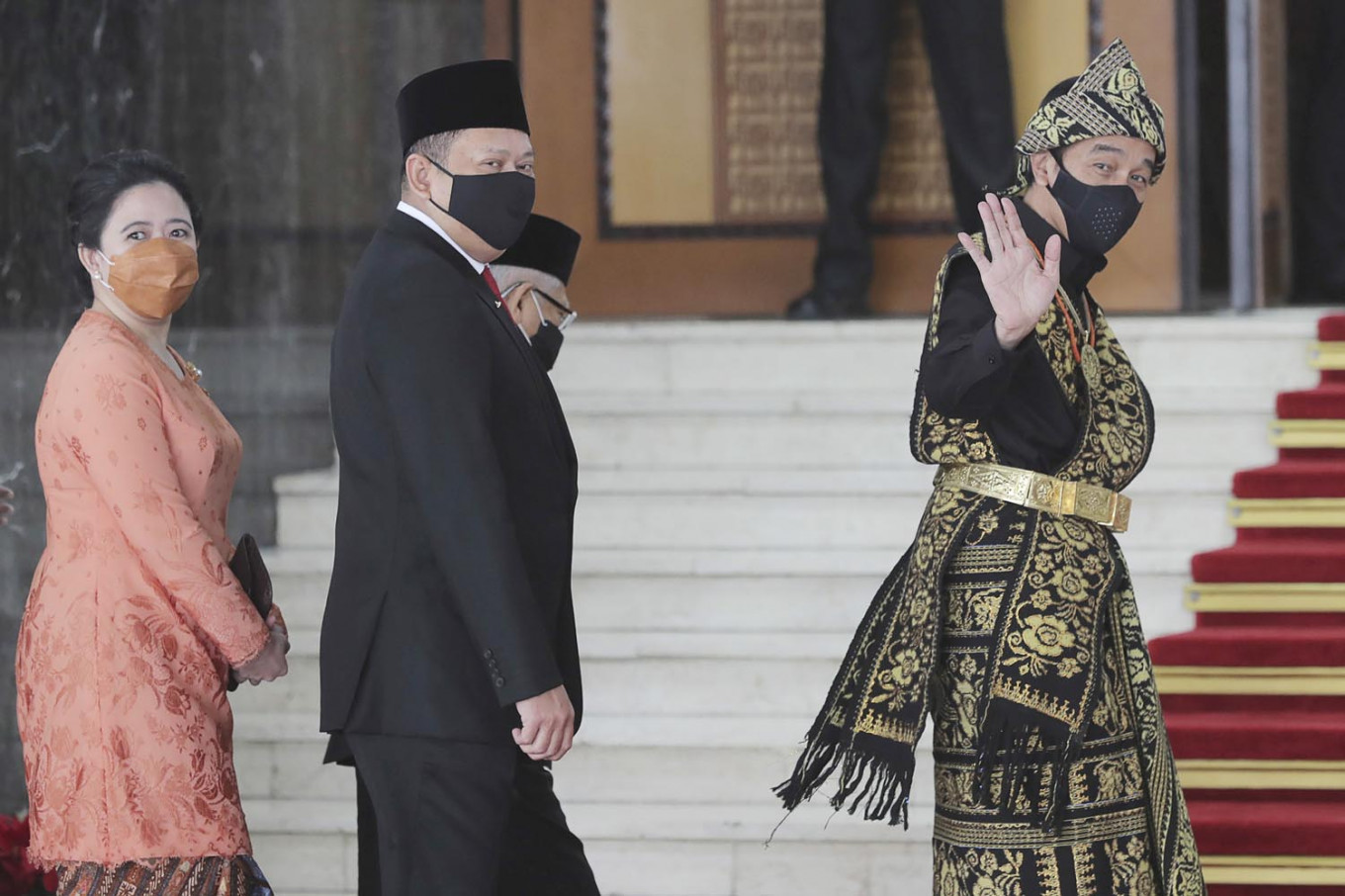Popular Reads
Top Results
Can't find what you're looking for?
View all search resultsPopular Reads
Top Results
Can't find what you're looking for?
View all search resultsRecovery, reform key to 2021 state budget
Change text size
Gift Premium Articles
to Anyone
E
conomic recovery and structural reform are at the core of the government’s 2021 state budget policy as the COVID-19 pandemic has paralyzed the economy and caused a health and social crisis in Indonesia.
The government is directing the fiscal policy for next year toward accelerating economic activity and reforming the bureaucracy to boost productivity, innovation and competitiveness, push for digital transformation and take advantage of demographic dynamics.
“Structural reform must also be carried out in education, health, social protection and budgeting and the taxation system,” President Joko “Jokowi” Widodo said in his annual state budget speech before the People’s Consultative Assembly in Jakarta on Friday.
The coronavirus outbreak led to a contraction in the country’s economy of 5.32 percent in the second quarter this year, and all components of economic activity fell significantly. The government expects the economy to contract by 1.1 percent this year, or to grow 0.2 percent in the best-case scenario.
As a consequence, around 3.7 million workers have lost their jobs so far this year, according to data from the National Development Planning Agency (Bappenas), a number that is expected to hit around 10 million by the end of the year.
At the same time, the outbreak has also exposed Indonesia’s healthcare gap as unequal distribution and shortages of testing and medical supplies, hospital beds, health and lab workers have hindered the COVID-19 response.
Jokowi in his state of the nation address earlier in the day also reiterated the need to carry out regulatory reform to cut red tape that has hampered investment in the country.
“We dedicate all of this to a fair national economy that caters to the interests of workers and job seekers in order to alleviate poverty by providing the widest possible quality employment opportunities,” he said.
The government expects state revenue to reach Rp 1.77 quadrillion (US$119.79 billion) next year while state expenditure is expected to be Rp 2.74 quadrillion. Therefore, the budget deficit is set at Rp 971.2 trillion, 5.5 percent of the gross domestic product (GDP) next year, compared with an estimated 6.34 percent of GDP this year.
It also pledges to continue this year’s stimulus allocation into 2021, which will include funding for social protection and micro, small and medium enterprises (MSMEs) support, while fiscal relaxation will be implemented again to support the government’s agenda.
The government is allocating Rp 356.5 trillion in economic recovery stimulus funding next year in an effort to further support the country’s economic recovery, as well as to strengthen the healthcare system, including the provision of a coronavirus vaccine.
However, experts have expressed concern at the government’s policy as uncertainty surrounding the pandemic remains.
“There are several sectors that will be like sinkholes if we give them too much stimulus funding while the COVID-19 pandemic is yet to end,” said Bank Central Asia (BCA) economist David Sumual on Friday. “It will be difficult [to see a positive result] if our tax money enters into bad sectors, such as tourism, aviation and transportation.”
The government will provide Rp 136.7 trillion in next year’s stimulus for ministries and regional administrations to improve tourism, food security, industrial areas, communication and technology development and as loans for regions, among other projects.
By comparison, only Rp 25.4 trillion will be allocated for health care, including the procurement of coronavirus vaccines once they are available, Rp 110.2 trillion for social aid and Rp 48.8 trillion for MSMEs.
“As long as COVID-19 is still there, the people will remain pessimistic,” David said.
Bank Permata economist Josua Pardede expressed a similar view, saying the government’s optimistic macroeconomic assumption for next year was still surrounded by virus uncertainty.
“The key is how successful Indonesia’s and the global COVID-19 containment efforts are so that people’s confidence and spending can improve,” he said.
The government projects the GDP to rebound and grow by 4.5 percent to 5.5 percent next year and forecasts the rupiah exchange rate to be around Rp 14,600 per US dollar.
“Next year’s economic projection, despite the recovery, is dependent on the COVID-19 containment,” Finance Minister Sri Mulyani Indrawati told a virtual press briefing on Friday.
“The people’s discipline, vaccine availability and fiscal expansion through continuing the national economic recovery program will determine [the economy],” she added.
The government will also continue next year its cooperation with Bank Indonesia to finance the budget deficit. As debt monetization is only being applied this year, the central bank is expected to remain the standby buyer for Indonesian government bonds.
“We will maintain BI’s ability to participate in auctions to create a stable and balanced supply and demand,” Sri Mulyani said.










